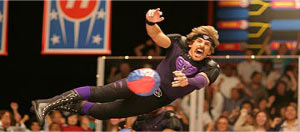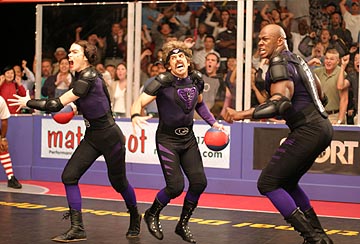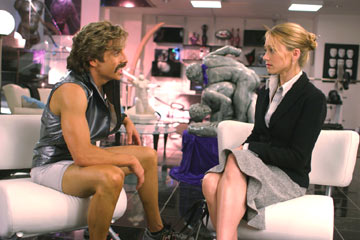
Rawson Marshall Thurber On DODGEBALL
June 17th, 2004

Dodgeball is one of those comedies that nobody will take seriously. It’s about a ridiculous sport with ridiculous caricatures including a fitness guru, a she-male and a pirate. Yet the laughs are consistent, obviously written with a clear understanding for comic structure.
Writer-director Rawson Marshall Thurber makes his feature film debut with Dodgeball. He had written and directed some shorts, but the movie kind of comes out of nowhere, a true underdog success story. Speaking a mile a minute, Thurber explains how he fought for the film and ultimately got his ideal cast and the chance to direct it himself.
How would you characterize the style of humor in this movie? A) I think the movie is definitely a broad comedy but we did our best and I certainly did my best to make sure there’s a lot of different comedy throughout the whole movie. I’m kind of a comedy snob, which doesn’t mean I only like jokes about the quadratic equation. I like a good football in the groin. It just has to be done right. That’s what is important to me. Just the execution of different types of comedy that’s important, so for me I knew I was making a broad comedy about dodgeball, but I wanted it to be the kind of dodgeball movie that I’d want to go see. So at least hopefully, it’s really, really stupid and hopefully clever at times and kind of oddly charming. But the comedy, I think it runs a gamut between just the really asinine to the slightly tongue and cheek to even occasionally clever. So, for me, some of my favorite jokes in the movie aren’t people getting hit in the testicles and falling over, though I like those. There’s [sportscaster] Cotton McKnight says, �So don’t go anywhere folks because Darwin’s cruelest play is about to unfold here today. So don’t go anywhere folks the schadenfreude is about to begin.� That kind of stuff makes me laugh. And I think there’s a reference to Lewis Carrol in there. Just stuff to essentially impressive my English professor in college. So that’s essentially the idea, that it goes everywhere. If you like people getting hit with things and falling and hurting themselves, we’ve got that. If you like kind of smarty pants humor, we sort of feather that in every once in a while. And if you don’t get one joke it’s okay because the next joke is thirty seconds away.
 How did you think of this idea? For me, at least something that’s kind of interesting about dodgeball, at least recently, it’s just starting to get kind of bubble up a little bit more. And when I started writing the script in April 2001, dodgeball I just thought was a really, really funny idea for a movie, for the sport in the movie. And then just around the fall of that year there was an educator, southern educator, who was trying to get dodge ball outlawed in schools, because it was a sport of violence, exclusion and derogation. And so I licked my pencil tip and wrote that right in the script, and said, �Thank you very much.� Then Briant Gumble did a piece on it and then one of my favorite, favorite comedians Steven Colbert of the Daily Show did a short little segment on it. So it was just kind of bubbling there and then just, I would say in the last six to eight months it’s kind of really started to hit, hit it’s stride.
How did you think of this idea? For me, at least something that’s kind of interesting about dodgeball, at least recently, it’s just starting to get kind of bubble up a little bit more. And when I started writing the script in April 2001, dodgeball I just thought was a really, really funny idea for a movie, for the sport in the movie. And then just around the fall of that year there was an educator, southern educator, who was trying to get dodge ball outlawed in schools, because it was a sport of violence, exclusion and derogation. And so I licked my pencil tip and wrote that right in the script, and said, �Thank you very much.� Then Briant Gumble did a piece on it and then one of my favorite, favorite comedians Steven Colbert of the Daily Show did a short little segment on it. So it was just kind of bubbling there and then just, I would say in the last six to eight months it’s kind of really started to hit, hit it’s stride.
How many sports clich�s are in this movie? Oh God, I tried to put them all in. I mean, I really did. I’m a sports nerd and I tried to use every single one that I could remember. Especially [the characters] Cotton McKnight and Pepper Brooks. Gary Cole I’m absolutely in love with and Jason Bateman was fantastic also as the idiot. I just hate sportscasters so much, I hate the bad ones, and I love the good ones. I mean, I love Al Michaels and I love Jon Miller, and I love Joe Morgan, and obviously I was a big Chick Hearns fan. But when it’s done badly, which it so often is, especially like for local sports when it’s not a nationally televised game, you just want to pull your hair out. And so, those two guys specifically were kind of my take on the clich� sports announcers where Cotton McKnight will use three words when one will suffice, and he has obscure references that no ones ever really get. Pepper Brooks, I remember I watched the Extreme Games on ESPN, and there’s a guy doing it, I don’t know which sportscaster it was, but I’d seen him on ESPN where he wears like a suit and tie. And then he goes on the Extreme Games and they put him like in a polo and f*ck his hair up. So somehow he’s extreme, and it was really sad and so I kind of wanted to do that with Pepper Brooks, that he’s really kind of the dim witted, the worst color commentator of all time. He’s just really passionate, really enthusiastic and always wrong. And just makes the most obvious statements, like �He’s not going to be able to see very well Cotton.� Just like the dumbest stuff ever. So also on the clich�s, there’s �Oh that’s going to hurt.� And, the whole movie is essentially one big clich�. Originally it was called just Underdogs and that’s just what it is. It’s my homage to all the movies that I saw, that I loved growing up. I was a big fan of Stripes, Caddy Shack, Meatballs, and specifically, especially Ghostbusters, which is, I think, is the best comedy ever made as far as I’m concerned. Revenge of the Nerds, I mean, for one you couldn’t make that movie nowadays. But secondly, I mean, if you get to see it again it is perfectly, perfectly structured.
 Why do you think you couldn’t make Nerds today? The stereotypes are so broadly drawn that I think you’d have so many groups up in arms about �you can’t portray people this way.� When I think the reason that Revenge of the Nerds works is because you love those people and they had to be stereotypes. You had to have the Asian guy with the camera taking the pictures. You had to have the burn out picking his nose. You had to have the two dorky computer guys, you had to have the gay black guy. You had to have these stereotypes because they represented so much, so much more in the movie. And I think if you tried to do it now, I just think that the culture wouldn’t allow that kind of story telling, currently. And I love that movie specifically because I think it’s so bold, and I think it doesn’t pander to those expectations. And, those characters are f*cking great. You love them. Who doesn’t want to be a Tri-Lam? I do.
Why do you think you couldn’t make Nerds today? The stereotypes are so broadly drawn that I think you’d have so many groups up in arms about �you can’t portray people this way.� When I think the reason that Revenge of the Nerds works is because you love those people and they had to be stereotypes. You had to have the Asian guy with the camera taking the pictures. You had to have the burn out picking his nose. You had to have the two dorky computer guys, you had to have the gay black guy. You had to have these stereotypes because they represented so much, so much more in the movie. And I think if you tried to do it now, I just think that the culture wouldn’t allow that kind of story telling, currently. And I love that movie specifically because I think it’s so bold, and I think it doesn’t pander to those expectations. And, those characters are f*cking great. You love them. Who doesn’t want to be a Tri-Lam? I do.
Was this a spec script? It was a spec. I wrote it, like I said over in 2001 and I didn’t have an agent or anything. I got an agent based on the script and we sent it out to studios everywhere and everyone in town passed and they all passed with essentially the same thing. �Wow, this is really funny. We don’t want to make a dodgeball movie, and we don’t validate, so thank you.� It was really frustrating for me because I thought it was really funny. I really loved the script and people weren’t making it, or didn’t want to make it because no one had ever made a dodgeball movie before and there was no sort of data about how they do at the box office. You know you can’t judge how it’s going to play. So, by the time I went to sit down with Stuart Cornfeld at Red Hour I was just so beaten down by being told no over and over, in the same way, the same kind of awful way, of like �Wow, you’re really pretty, we don’t want to date you though.� So I went in and sat down on Stuart’s couch in his office first time I met him, and I don’t even think I let him get a word in edgewise. I just sort of launched into this sort of ten minute frothy tirade about why he had to make the movie, and if he didn’t he’d be crazy and here’s why, and blah, blah, blah, blah, blah, you know. And he just sort of sat back and he just sort of stopped me and went, �We like the script, we want to do it, we just want to talk about you.� It was like, oh wow, great, and they were just unbelievably fantastic. And then Ben [Stiller] read it, and I met with Ben, and we sort of saw it the same way. The creepy thing, or the special thing I suppose is, I’m sitting in my apartment in Hollywood and I’m writing the script and I’m writing the role of White Goodman for Ben Stiller, and I wrote the role of Peter La Fleur for Vince Vaughn. And every once in a while I’d see Vince walk by at my local coffee shop and I’d just think to myself, �I know something you don’t know.� And, never imagining in my wildest fantasies that I would ever get either of them. And for me Ben Stiller is a comedy idol of mine. I remember watching The Ben Stiller Show in high school and just, it was like nothing I’d ever seen. I thought it was the smartest, the funniest, the best, and I’ve just been an absolute geek Ben Stiller fan, like an uber geek forever, and I can say, truthfully coming out of this movie, I’m still a big, big geeky Ben Stiller fan.
What are you working on next? I’ve got ideas for more movies that I want to do. The goal is to write and direct for hopefully a long time. I love sports. My favorite film of all time is Bull Durham and I love The Best of Times and Hoosiers obviously. The uniforms in the movie that Average Joe’s wear, the colors are as close as I could get to the gold and red of the Hoosiers outfits. But yeah, I love sports. I hope to make a football film and there are a few other ideas that aren’t necessarily comedies. They’re a little more adventure-y.
More recent articles in Interviews
Only logged-in members can comment. You can log in or join today for free!
No comments posted.
Advertisement

















